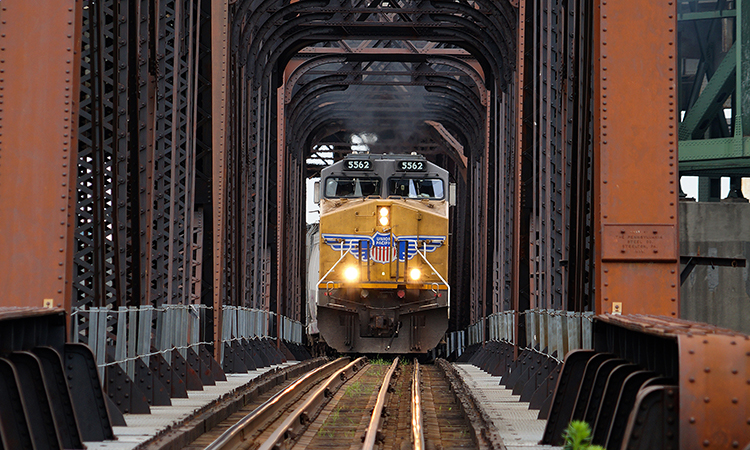Union Pacific publish second comprehensive Climate Action Plan
Posted: 17 November 2022 | Elliot Robinson (Editorial Assistant - Global Railway Review) | No comments yet
Union Pacific have highlighted efforts to address climate change and outlined long-term strategies to reduce GHG emissions in their Climate Action Plan.


Union Pacific Railroad has published its second comprehensive Climate Action Plan, highlighting the significant and innovative steps taken to address climate change, while outlining long-term strategies to reduce greenhouse gas (GHG) emissions and achieve net zero by 2050.
“Last year, we embarked on a journey to improve our environmental footprint and build a more sustainable economy for generations to come,” Beth Whited, Executive Vice President and Chief Human Resource Officer for Union Pacific, said. “Our mission continues, and we remain committed to finding and embracing bold solutions to address climate change and achieve net zero emissions.”
Commitment to net zero
Since the publication of its first Climate Action Plan in 2021, Union Pacific has taken considerable steps to reduce its environmental impact, including increasing the use of low-carbon fuels and reducing fuel consumption by more than 11 million gallons in 2021 compared with 2020.
Union Pacific have also reaffirmed its commitment to reach net zero GHG emissions. Last month, Union Pacific joined the Business Ambition for 1.5°C, an alliance of more than 3,000 companies pledged to taking bold action to limit global warming to 1.5°C. As part of that pledge, we committed to the Science Based Targets Initiative (SBTi) to revalidate our short-term target in line with the 1.5°C global warming scenario and develop a long-term, science-based target to reach net zero value chain GHG emissions by 2050.
During 2022, Union Pacific conducted an extensive climate scenario analysis to better understand the hypothetical impacts of climate change on its operations, infrastructure, supply chains and customers under both high- and low-carbon future scenarios. The analysis is being used to evaluate and develop potential strategies that address both future risks and opportunities arising from climate change.
Related news you will enjoy:
Union Pacific invest in EVs to support its net zero emission goals
Union Pacific sign largest modernisation deal in rail history with Wabtec
Highlights of the 2022 Action Plan
Additional highlights of Union Pacific’s 2022 Climate Action Plan include:
- Continued modernisation of existing locomotives – During 2021, Union Pacific continued modernising its locomotive fleet by upgrading 120 older units. These modernisations not only improve locomotive reliability but make each unit up to five per cent more fuel efficient and emit approximately 53 per cent less emissions. In 2022, Union Pacific announced the largest-ever investment in modernised locomotives in rail industry history: an agreement with Wabtec Corporation for 600 locomotive modernisations, worth more than $1 billion
- Plans to purchase new battery electric locomotives – Union Pacific announced plans to purchase North America’s largest carrier-owned fleet of battery-electric locomotives for testing in freight yard operations and are piloting this technology in its early adoption phase to better understand how it could be deployed at scale in operations
- Increased use of renewable and biofuels – Working together with locomotive and fuel suppliers, Union Pacific increased its use of renewable diesel and biofuels. 2021 low-carbon fuel consumption rose to three per cent of total diesel consumed, up from 2.2 per cent in 2020. As the end of 2022 approaches, this number is climbing above four per cent
- Improved Energy Management System (EMS) utilisation – In 2021, Union Pacific’s full-year fuel consumption rate improved one per cent, a new record low. This represents the third consecutive year Union Pacific improved fuel consumption rate on a year-over-year basis. By the end of 2022, EMS will have been implemented in approximately three-quarters of Union Pacific’s active road fleet
- The first U.S. railroad to formally support the Task Force on Climate related Financial Disclosures (TCFD) – This reinforces Union Pacific’s commitment to transparent disclosure. Union Pacific is committed to continuing to implement the TCFD framework in its climate reporting.
“We must continue to be forward thinking in our initiatives to see reductions in our absolute emissions. Climate change is caused by human behaviour and recognising our community impact is imperative,” Maqui Parkerson, Vice President of Labour Relations and Sustainability for Union Pacific, said. “As a leader in the rail industry and critical link in the supply chain, we will continue to strive to be a leader in the overall climate solution.”
Related topics
Electric/Hybrid Rolling Stock, Operational Performance, Regulation & Legislation, Sustainability/Decarbonisation






